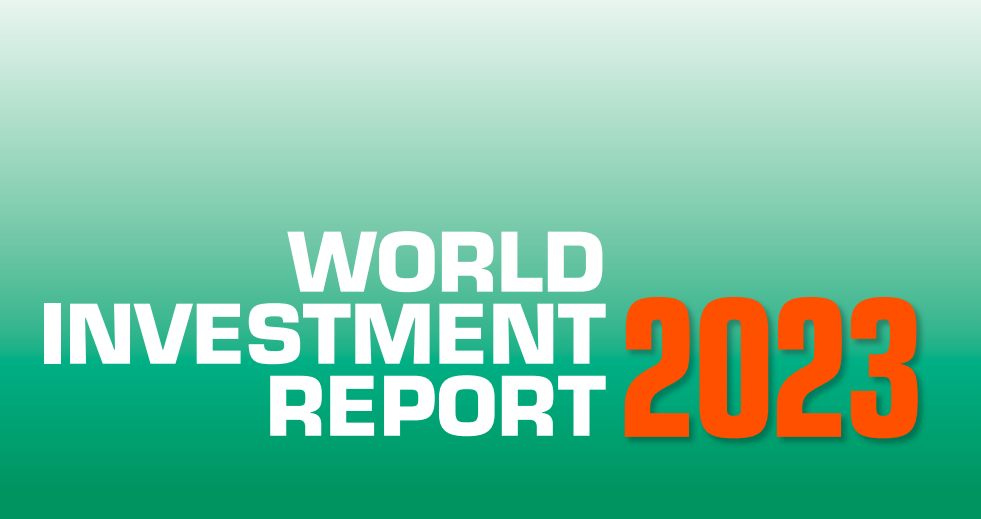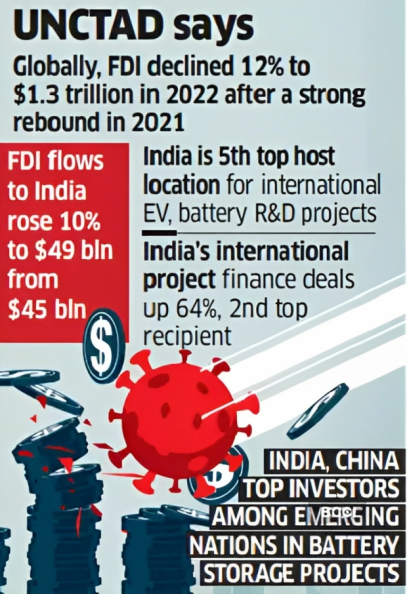Description

Copyright infringement not intended
Context: According to the World Investment Report 2023 released by the United Nations Conference on Trade and Development (UNCTAD), foreign direct investment (FDI) in developing countries in Asia remained at $662 billion in 2022, accounting for about half of the global inflows.
Details
- The report said that India and ASEAN were the most resilient destinations, with FDI increases of 10% and 5%, respectively, and robust growth in project announcements.
Highlights of the Report
- Developing countries received more FDI than developed economies in 2022.
- FDI worldwide fell 12% to $1.3 trillion in 2022 after a sharp recovery in 2021 from the severe impact of the coronavirus pandemic.
- China, the world's second-largest FDI host country, registered a 5% rise in FDI.
- FDI in the Gulf region dropped, but the number of project announcements surged by two-thirds.
- The report also said that many smaller developing countries saw no change in FDI inflows, and FDI to the least developed countries (LDCs) decreased.
- The report highlights the importance of investing in sustainable energy for all, as most of the international investment in renewable energy has been in developed countries.
- It urges more support for developing countries to close the gap by attracting huge investments in clean energy.
- Developing countries require renewable energy investments of around $1.7 trillion per year but only received foreign direct investment in clean energy of $544 billion in 2022.
- The report recommends reducing the risk of energy transition investment in developing countries through loans, guarantees, insurance instruments and equity participation from both the public sector - through public-private partnerships and blended finance - and multilateral development banks. It also proposes a "new model of climate-aligned dealmaking".
- According to the report, the investment gap for all the Sustainable Development Goals has risen to more than $4 trillion per year from $2.5 trillion in 2015.
- The biggest gaps are in energy, water and transport infrastructure. The increase is due to both underinvestment and additional needs.

United Nations Conference on Trade and Development (UNCTAD)
- The United Nations Conference on Trade and Development (UNCTAD) is a specialized agency of the United Nations that deals with issues related to international trade, investment, development and cooperation.
- It was established in 1964 by the UN General Assembly as a permanent forum for discussing and addressing development challenges, especially those related to international trade.
- UNCTAD's main objectives are to help developing countries integrate into the global economy, to assist them in diversifying their exports, to enhance their productive capacities, and to support their efforts to achieve the Sustainable Development Goals.
- It provides policy advice, technical assistance, and research on various topics such as trade, finance, technology, aid, and transport.
- It convenes a conference every four years, where member states adopt resolutions and set the organization's priorities.
- UNCTAD has 195 member countries and is headquartered in Geneva, Switzerland.
- Reports published by the UNCTAD include the Trade and Development Report, The Least Developed Countries Report, and the Commodities and Development Report.
Must-Read Articles:
ASEAN: https://www.iasgyan.in/daily-current-affairs/asean
FDI IN INDIA: https://www.iasgyan.in/daily-current-affairs/fdi-in-india
|
PRACTICE QUESTION
Q. What is the difference between Foreign direct investment (FDI) and Foreign portfolio investment (FPI)?
A) FDI involves acquiring a lasting interest and a degree of control or influence over a foreign enterprise, while FPI involves acquiring a temporary interest and no control or influence over a foreign enterprise.
B) FDI involves acquiring a temporary interest and no control or influence over a foreign enterprise, while FPI involves acquiring a lasting interest and a degree of control or influence over a foreign enterprise.
C) FDI involves acquiring a lasting interest and no control or influence over a foreign enterprise, while FPI involves acquiring a temporary interest and a degree of control or influence over a foreign enterprise.
D) FDI involves acquiring a temporary interest and a degree of control or influence over a foreign enterprise, while FPI involves acquiring a lasting interest and no control or influence over a foreign enterprise.
Answer: A
Explanation: FDI and portfolio investment are two types of cross-border investment. FDI involves acquiring at least 10% of the voting power or equity of a foreign enterprise, which implies a lasting interest and a degree of control or influence over its management and operations. Portfolio investment involves acquiring less than 10% of the voting power or equity of a foreign enterprise, which implies a temporary interest and no control or influence over its management and operations.
|

https://economictimes.indiatimes.com/news/economy/finance/india-asean-most-buoyant-fdi-recipients-unctad/articleshow/101521702.cms














